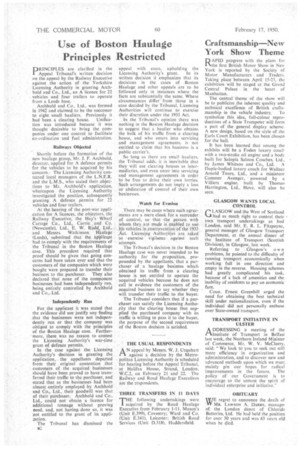• Use of Boston Haulage • Principles Restricted
Page 36

If you've noticed an error in this article please click here to report it so we can fix it.
DRINCIPLES are clarified in the
Appeal Tribunal's written decision on the appeal by the Railway Executive against the action of the Yorkshire Licensing Authority in granting Archbold and Co., Ltd., an A licence for 22 vehicles and four trailers to operate from a Leeds base.
Archbold and Co., Ltd., was formed in 1942 and claimed to be the successor to eight small hauliers. Previously it
had been a clearing house. Unification was introduced because it was thought desirable to bring the companies under one control to facilitate co-ordination and fuel administration.
Railways Objected Shortly before the formation of the new haulage group, Mr, J. F. Archbold, director, applied for A defence permits for the vehicles to be acquired by his concern. The Licensing Authority contacted local managers of the L.N.E.R. and the L.M.S., who stated their objec7 tions to Mr. Archbold's application, whereupon the Licensing Authority investigated the position, subsequently granting A defence permits. for 22 • vehicles and four trailers. .
At the hearing of the post-war application for A licences, the objectors. .the Railway Executive, the Ha_y's Wharf Cartage Co.. Ltd.. Currie and .Co. (Newcastle), Ltd.. E. W. Rildd, Ltd., -and Messrs. Watkinson Haulage (Leeds), submitted that the apPlicant had to comply with the requirements of the Tribunal in the Roston Haulage case. This precedent required that proof should be given that going concerns had been taken over and that the customers of the companies which were bought were prepared to transfer their business to the purchaser. They also declared that none of the component businesses had been independently run. being entirely controlled by Archbold and Co., Ltd.
independently Run For the applicant it was stated that the evidence did not justify any finding that the businesses were not independently run or that the company was obliged to comply with the principles of the Boston Haulage case. Furthermore, there was no reason to contest the Licensing Authority's war-time grant of defence permits.
In the case against the Licensing Authority's decision in granting the application, the appellants departed from their original contention that customers of the acquired businesses should have been proved to have transferred their traffic to the purchaser, and stated that as the businesses had been almost entirely employed by Archbold and Co., Ltd, their goodwill was that of their purchaser. Archbold and Co., Ltd., could not obtain a licence for additional tonnage without proving need, and, not having. done so, it was not entitled to the grant of its appliseation.
The Tribunal has dismissed the
112
appeal with costs, upholding the Licensing Authority's grant. In its written decision it emphasizes that its decisions in the cases of . Boston Haulage and other appeals are to be followed only in instances where the facts are substantially the same. Where circumstances differ from those in a case decided by the Tribunal, Licensing Authorities will continue to exercise their discretion under the 1933 Act.
In the Tribunal's opinion .there was nothing in the Boston Haulage decision to suggest that a haulier who obtains the bulk of his traffic from a clearing house, and who enters into servicing and management agreements, is not entitled to claim that his business is a public carrier's.
So long as there are small hauliers, the Tribunal adds, it is inevitable that they will use clearing houses as intermediaries, and even enter into servicing and management agreements in order be free to drive 'their own lorries. Such arrangements do not imply a loss or ahdication of control of their own businesses. '
,Watch for Evasion
There may be cases where suCh agreements are a mere.eloak tor a surrender of control, so that. the person,. with Whom they are 'made is enabled to use hisvehicles in contravention ..of-th-e".1933 _Act. Licensing, Authorities are, asked to . exercise vigilamee against such attempts.
The Tribunal's decision in the Roston Haulage case was never intended to be authority for the proposition, propounded by the appellants, that a purchaser of a haulage business which obtained its traffic from a clearing house is net entitled to operate the acquired vehicles because he does not call in evidence the customers of the acquired business to say whether they will transfer their traffic to the buyer.
The Tribunal considers that if a purchaser can satisfy the Licensing Authority that the clearing house that supplied the purchased company with its traffic is willing to pass it to the buyer, the purpose of the second requirement of the Boston decision is satisfied.
THE USUAL RESPONDENTS
AN appeal by Messrs. W. J. Urquhart against a decision by the Metropolitan Licensing Authority is scheduled for hearing before the Appeal Tribunal, at Halifax House, Strand, London, W.C.2, on February 21 and 22. The Railway and Road Haulage Executives are the respondents.
THREE TRANSFERS IN II DAYS
'THE following undertakings were
1. acquired by the Road Haulage Executive from February 1-11. Mason's (Unit E.399), Coventry; Ward and Co. (Unit E.341), Leicester; British Road Services (Unit D.318), Huddersfield.




























































































